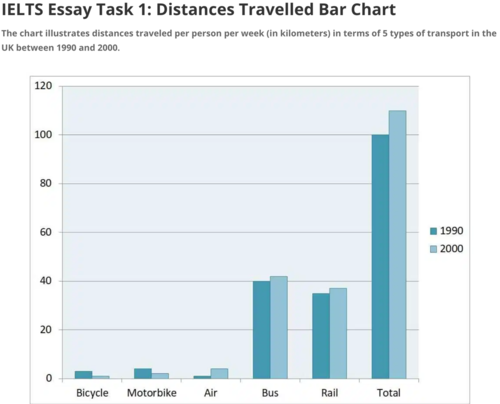
The bar graph details the changes in travel habits by fives different modes of transport in both 1990 and 2000 in the UK. Looking from an overall perspective, it is readily apparent that the rise in total figures over the period was a result of increases from rail, bus, and air as bicycle and motorbike usage fell. The most common forms of travel were by far bus and rail.
Looking first of all at the two leaders, bus use accounted for precisely 40 kilometres in 1990, before a small increase of 5% to 42 by 2000. Rail was lower in both periods at 36 and 38 km, respectively. The lesser used modes of transport were all below 5km per week. Travel by bicycle started at 2 and halved to 1km while motorbikes also halved from 4 to 2km. Finally, air travel in 1990 was just above 1 but quadrupled to 4km per month per person by 2000.
Overall totals constituted 100km in 1990 and a subsequent increase of 10% to 110km by the end of the surveyed period.
TASK 2
BREAKING TRAFFIC LAWS
Not all drivers obey the law whilst driving on roads.
What are the reasons for this?
What can be done to fix the problem?
It is very common globally for motorists to break the rules when driving. The reasons for this typically relate to personality and extreme situations and the best solutions involve various governmental regulations.
Individuals often do not follow traffic laws because of individual temperament and exceptional circumstances. Regarding the former reason, there are many who have a more rebellious attitude towards rules in general that may extend to all areas of their lives, including driving. This could itself be the result of upbringing, hereditary factors, or societal influences. The second reason could be being in an impaired state. These situations include being in a rush, driving under the influence of drugs or alcohol, using a portable device while driving, or being tired. All these contexts imply that the breaking of the rules is a result of neglect rather than harmful intent.
In order to remedy these public safety hazards, governments must implement comprehensive, long-term reforms. The fastest fix is stricter penalties for infractions. If the repercussions for speeding, for example, included jail time, then this would act as a powerful deterrent. However, it does little to address the root causes of misbehaviour. To counter this, governments must regulate the advertising and distribution of alcoholic beverages. Most accidents are caused while individuals are under alcoholic influence and therefore any measures taken against the drinks industry will likely have the greatest impact. The government could also legislate in other related areas including requirements for licenses, raising the awareness of driving safety in schools, and limits on the hours truckers and taxis can drive to avoid driver fatigue.
In conclusion, the causes of rule-breaking on roads are mostly related to personality, and the ideal solutions come from government intervention. Individuals also play a role but governments can affect the greatest changes.


 English
English 日本語
日本語 中文(简体)
中文(简体) 中文(繁體)
中文(繁體) 한국어
한국어 Italiano
Italiano español
español Deutsch
Deutsch Русский
Русский






